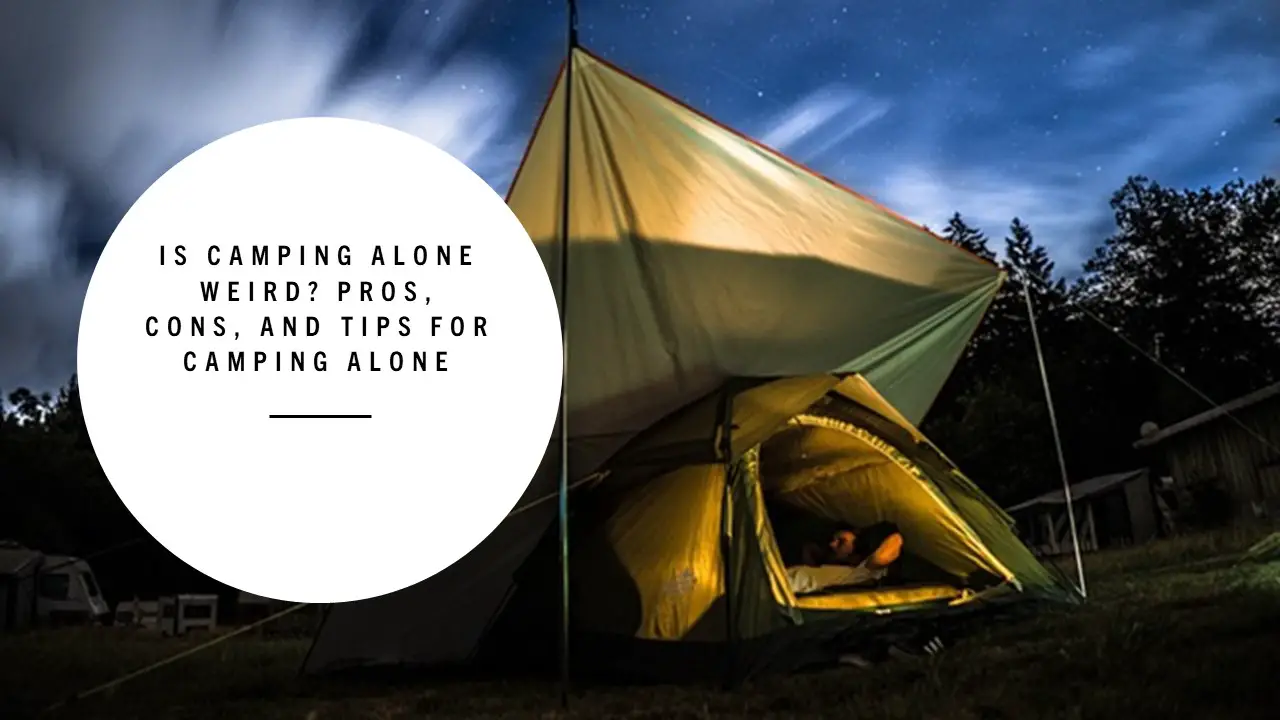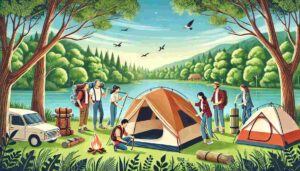Camping is a beloved pastime for many people, providing an opportunity to escape the hustle and bustle of daily life and connect with nature. However, when it comes to camping alone, some may wonder if it’s weird or unusual to venture out into the wilderness without company.
The answer is no, camping alone is not inherently weird. While it’s not for everyone, solo camping can be a unique and rewarding experience that offers an opportunity to connect with nature, build self-reliance, and embrace solitude. However, it’s important to take necessary precautions and be prepared for the challenges that come with camping alone.
In this article, I will explore the pros and cons of camping alone, address safety concerns, discuss the benefits of embracing solitude, and offer suggestions for finding community while camping alone.
The Pros and Cons of Camping Alone
Camping alone can be a unique and rewarding experience, but it’s important to consider both the pros and cons before embarking on a solo camping trip. Here are some of the advantages and disadvantages of camping alone:
Pros:
- Increased self-reliance: When camping alone, you are solely responsible for your own safety and well-being. This can help build self-confidence and independence.
- Solitude: Camping alone offers a rare opportunity to disconnect from the outside world and enjoy some much-needed solitude. This can be a great way to recharge and reflect on your life.
- Connection with nature: Without the distraction of other people, it’s easier to fully immerse yourself in the natural world and appreciate its beauty and complexity.
- Flexibility: When camping alone, you can set your own schedule and make decisions without having to consult with anyone else.
Cons:
- Safety concerns: Camping alone can be risky, especially if you’re not experienced or if you’re in a remote or unfamiliar area. There’s also a higher risk of encountering dangerous wildlife or getting lost.
- Loneliness: Being alone in the wilderness can be a lonely experience, especially if you’re used to being around other people.
- Lack of social interaction: Without anyone else around, there’s no opportunity for socializing or making new friends.
- Additional responsibilities: Camping alone means you’ll need to take care of all the necessary tasks, such as setting up camp, cooking, and cleaning, which can be exhausting and time-consuming.
Overall, camping alone can be a fantastic experience for those who value solitude and independence, but it’s important to carefully weigh the pros and cons before making a decision. If you do decide to go camping alone, be sure to take the necessary precautions to stay safe and comfortable.
Addressing Safety Concerns
Safety should be the top priority when camping alone, as there are a number of risks associated with being alone in the wilderness. Here are five tips to help you stay safe while camping alone:
- Choose a safe location: Before embarking on your trip, research the area you plan to camp in and make sure it’s safe and well-trafficked. Stick to established campsites or areas that are known to be safe for solo camping.
- Let others know your plans: Before you leave, inform someone you trust of your itinerary, including where you’re going, how long you plan to stay, and when you expect to return. This way, if something goes wrong, someone will know where to start looking for you.
- Pack appropriately: Make sure you have all the necessary gear, including a sturdy tent, a sleeping bag rated for the weather, appropriate clothing and footwear, and plenty of food and water. Bring a first-aid kit, a map, and a compass, as well as a reliable means of communication, such as a cell phone or satellite phone.
- Be aware of your surroundings: Always be aware of your surroundings and stay alert for potential dangers, such as dangerous wildlife or unsafe terrain. Make sure to follow any posted signs or warnings and avoid areas that are off-limits.
- Trust your instincts: If something doesn’t feel right or you sense danger, trust your instincts and take appropriate action. This may mean changing your plans, leaving the area, or seeking help.
Remember that solo camping is not for everyone, and it’s important, to be honest with yourself about your own abilities and comfort level. If you’re unsure about camping alone, consider joining a group or taking a guided trip to help build your skills and confidence.
Embracing Solitude
One of the main benefits of camping alone is the opportunity to embrace solitude. Here are some tips for making the most of this unique experience:
- Practice mindfulness: When you’re alone in nature, it’s easy to become fully present at the moment and appreciate your surroundings. Try practicing mindfulness techniques, such as meditation or deep breathing, to help you fully embrace the experience.
- Connect with nature: Spend time exploring your surroundings and appreciating the beauty of the natural world. Take time to listen to the sounds of the forest, watch the wildlife, and appreciate the changing light throughout the day.
- Bring a journal or sketchbook: Solo camping can be a great opportunity for self-reflection and creative expression. Bring a journal or sketchbook to record your thoughts, feelings, or sketches of the natural world.
- Read or listen to music: Bring a book or some music to help pass the time and provide a source of entertainment. This can also be a good way to unwind and relax.
- Try something new: Use your solo camping trip as an opportunity to try something new, such as stargazing, birdwatching, or learning a new skill, like campfire cooking.
- Embrace boredom: In our fast-paced world, we often view boredom as a negative experience. However, when camping alone, boredom can actually be a positive experience, providing an opportunity to rest, relax, and recharge.
The key to embracing solitude while camping alone is to allow yourself to fully experience the moment and appreciate the beauty of the natural world around you.
Finding Community While Camping Alone
Although camping alone offers a unique opportunity for solitude, it doesn’t mean you have to be completely isolated. Here are 5 suggestions for finding community while camping alone:
- Attend organized events: Many parks and campgrounds offer organized events, such as guided hikes, campfire talks, and nature walks. Attending these events can be a great way to meet other campers and connect with like-minded nature enthusiasts.
- Join online communities: There are many online communities focused on camping and outdoor activities. Joining these groups can be a great way to connect with other solo campers, share experiences, and get tips on the best places to camp alone.
- Strike up a conversation: When you’re camping alone, it can be easy to keep to yourself. However, don’t be afraid to strike up a conversation with other campers. You may be surprised at the interesting people you meet and the connections you make.
- Bring a dog: If you have a dog, consider bringing them along. Dogs are great conversation starters and can help break the ice with other campers.
- Share a campsite: Many campsites allow multiple tents on a single site. If you’re comfortable sharing a site, this can be a great way to meet other campers and save money on camping fees.
Remember, the key to finding community while camping alone is to be open to new experiences and willing to connect with others. However, it’s important to also respect your own boundaries and comfort level.
Conclusion
In conclusion, camping alone can be a fulfilling experience for those who seek solitude, self-reflection, and a deeper connection with nature. While it may seem unusual or even weird to some, it is a perfectly valid and enjoyable way to explore the great outdoors. However, it is important to be prepared and take necessary safety precautions, especially for first-time solo campers.
At the end of the day, whether or not camping alone is weird is a matter of personal preference, and it’s up to each individual to decide what kind of camping experience suits them best. So, why not give it a try and see for yourself whether camping alone is the right adventure for you?










